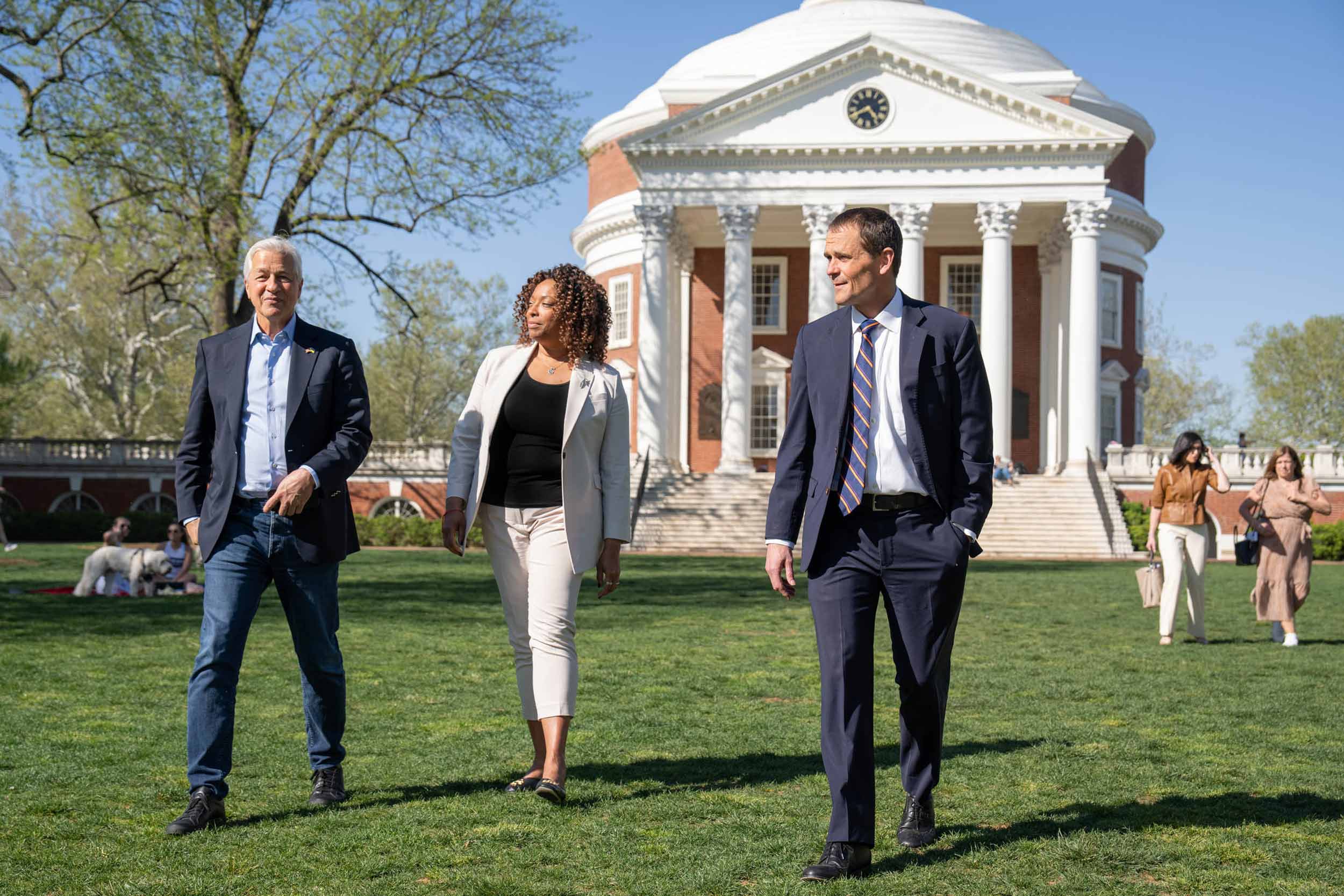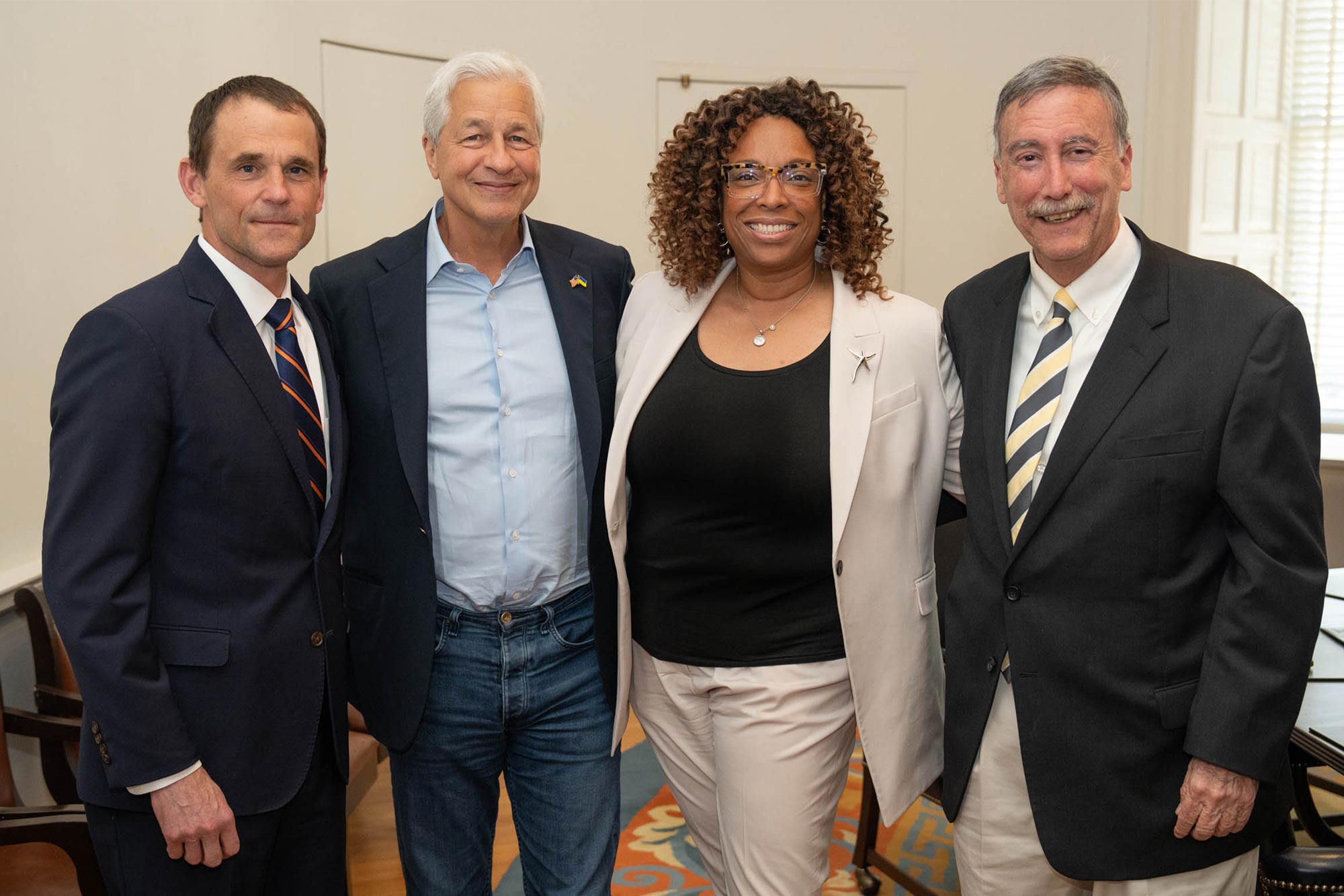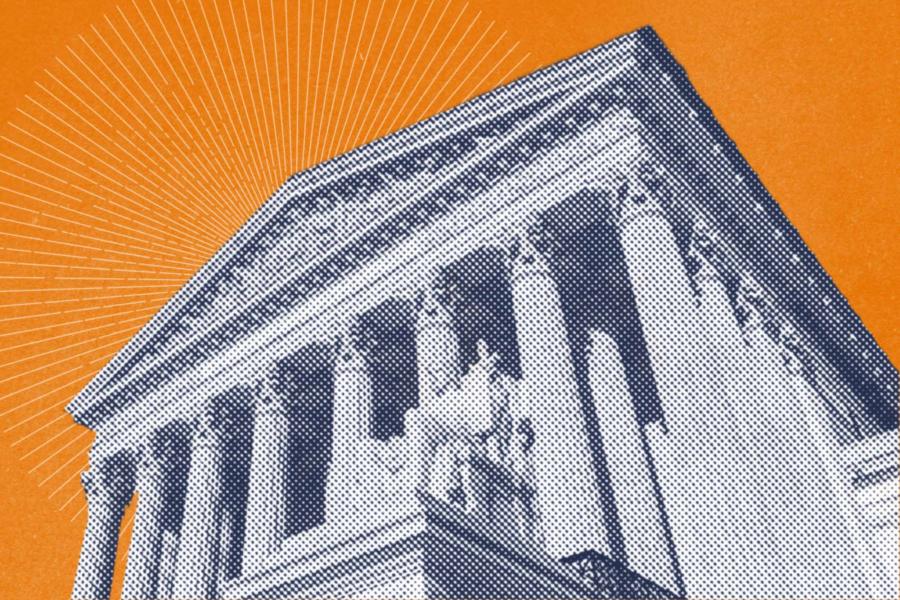Jamie Dimon, one of the most consequential leaders in the global financial services sector, visited the University of Virginia’s Grounds on Thursday to meet with students and discuss the relationship between democracy and capitalism in a conversation with McIntire School of Commerce Dean Nicole Thorne Jenkins.
What JPMorgan CEO Jamie Dimon Says About the Economy, Democracy and Capitalism

JPMorgan Chase CEO and Chair Jamie Dimon, left, McIntire School of Commerce Dean Nicole Thorne Jenkins, center, and UVA President Jim Ryan walk on the Lawn following a stop in the Rotunda on Thursday. (Photo by Sanjay Suchak, University Communications)
For Dimon, chair and CEO of JPMorgan Chase, the visit comes during a particularly consequential time for banking, investing and the course of the U.S. economy. The Federal Reserve continues its delicate dance on raising interest rates to bring down inflation, while trying to keep from tipping the economy into recession. At the same time, the recent failures of Silicon Valley Bank and other institutions have raised concerns about the stability of the banking sector.
JPMorgan Chase has been a consistent presence at UVA, interviewing and hiring students, participating in career events and engaging with students and faculty. Dimon’s visit was facilitated by UVA alumnus and parent Peter Engel, JPMorgan’s global chairman of investment banking and a member of McIntire’s Foundation Board.
The visit, hosted by McIntire, was also co-sponsored by the UVA Karsh Institute of Democracy and the Miller Center.
UVA Today caught up with Dimon before his Thursday evening session with Jenkins and a full-capacity audience in Nau Hall.

From left, UVA President Jim Ryan, JPMorgan Chase CEO Jamie Dimon, McIntire School Dean Nicole Thorne Jenkins and politics professor Larry Sabato, pictured in the Rotunda on Thursday. (Photo by Sanjay Suchak, University Communications)
Q. What’s your assessment of the U.S. economy, and how likely or unlikely it is that we are in recession or headed for recession?
A. The economy is doing pretty well, but there are storm clouds ahead. The good news is that we have healthy consumers, employment, higher wages, good credit, an increase in home values over the last 10 years, a recovering supply chain, normalized interest rates and a healthy business sector. The storm clouds ahead are abnormal fiscal spending and quantitative tightening by the Fed. Consumer excess savings will be close to zero by year end. We continue to have possible persistent inflation, requiring higher interest rates. Add to that the war in Ukraine, energy and trade uncertainty – including issues with China. The geopolitical tensions create additional risk.
I hope that everything turns out OK and that all of these storm clouds peacefully dissipate – we should be prepared for that outcome and also prepared for a new and uncertain future.
Q. What are the key indicators that you’re watching in the months ahead and why are they so important?
A. Interest rates, inflation, the Fed reducing its balance sheet through quantitative tightening, the yield curve, fiscal spending, debt ceiling, consumer spending and savings, among many others. There isn’t anything definitive about what we have seen – just weight on the scale.
Q. Are the banking sector issues, evidenced by the failure of Silicon Valley Bank and others, more reflective of management issues unique to certain entities or are you concerned the sector itself has significant risk moving ahead?
A. The banking system is safe, with extraordinary liquidity and extraordinary capital. The issues at those institutions were hiding in plain sight. Everyone knew about uninsured deposits, interest rate exposure and held-to-maturity portfolios. We aren’t seeing the issues that happened there at other regional banks.
Q. When Silicon Valley Bank failed, the government essentially guaranteed that no depositors would lose access to their deposits, even those with levels far higher than would normally be guaranteed. Is there a chance that kind of action could make some feel like they are operating in a risk-free environment with few consequences?
A. Any regulatory action needs to be thoughtful toward a view of its impact on the entire system. I am in favor of raising deposit insurance limits to help community banks, but policymakers should take a holistic view of the impact that raising limits would have among insured financial institutions and the non-bank financial sector. We should be mindful of any unintended consequences.
Q. What’s JPMorgan’s view on the most beneficial balance between government regulation of banking and the need for financial institutions to reduce risky behavior?
A. We are all for proper regulation. Oftentimes with a crisis, we see knee-jerk, whack-a-mole or politically motivated responses that often result in achieving the opposite of what people intended. Now would be the time to deeply think through and coordinate complex regulations to accomplish the goals we want, eliminating costly inefficiencies and contradictory policies. Very often, rules are put in place in one part of the framework without appreciating their consequences in combination with other regulations.
America has had, and continues to have, the best and most dynamic financial system in the world – from various types of investors to its banks, rule of law, investor protections, transparency, exchanges and other features.
Q. Capitalism has plenty of critics today and some see it as a threat to democracy. How would you describe your view on the positive relationship between the two?
A. Capitalism and democracy are intertwined. Democracy and human freedom are inseparable from freedom of speech, freedom of religion and free enterprise. I am a red-blooded, full-throated, free market, free enterprise capitalist. We should applaud free enterprise.
The health of America is the strength of its people, including human capital, brain power, its capability, its capital markets. We have the widest, deepest, most transparent capital markets the world has ever seen. Our success allows us to use our capabilities to lift up communities in multifaceted ways.
Q. This is a very tough economy for graduating students. What advice would you give to students attempting to enter the financial industry on how to stand out?
A. It may be a tough economy, but it continues to be a good job market in the financial industry. We’re hiring for positions all over the country. My advice is well worn – be prepared, do your research, practice interview skills, network and find work that you are passionate about and find fulfilling. Success will come.




